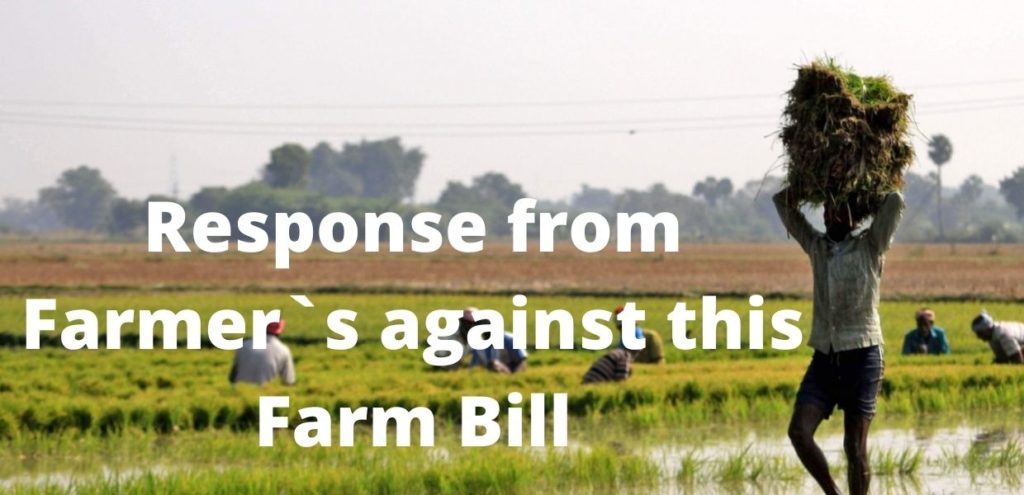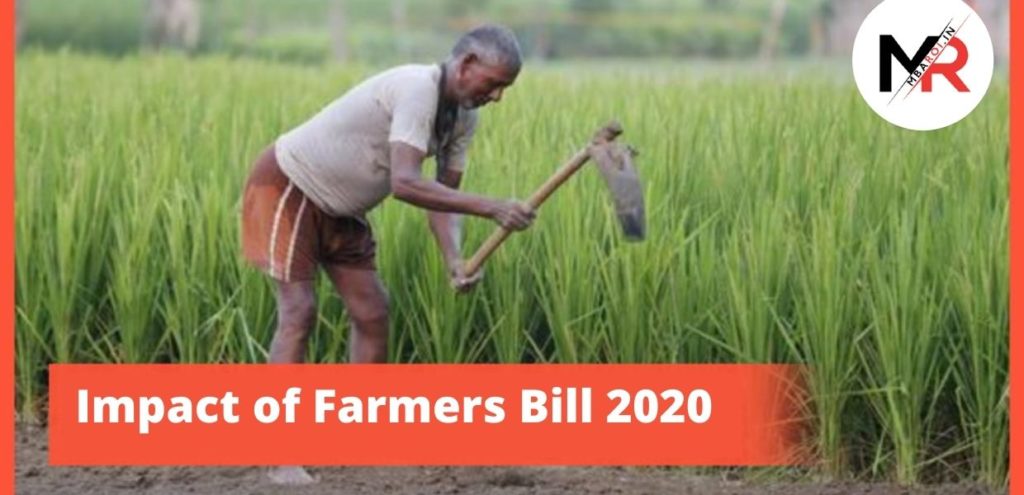What is Farmers Bill 2020| Impact of Farmers Bill 2020?

Update on Farm Bill 2020: Farm bill revoked. Yes, you heard it right!
Prime Minister Narendra Modi on Friday 19 November 2021, announced to repeal the three contentious agriculture laws that were enacted on September 17, 2020. Just after this unexpected announcement, TV news channels flooded with the discussion on why PM Modi repealed farm laws?
The talk about Farmers Bill 2020 sparked a lot of controversies in India over the past few months. While the government’s claim is that Farmers Bill is a historic step to the benefit of farmers, the oppositions described it as a ‘black law’.
Since the Farmers bill may destroy the existing system of Minimum Support Price (MSP) and the APMC Mandis, Farmers are skeptical about losing out on the government’s ongoing welfare benefits established in favor of the farmers.
Get Full Details About Farm Bill : Pros, Cons, and Challenges
Farmers Bill (Kisan bill) or the Indian Agriculture Acts 2020, were approved in Lok Sabha and Rajya Sabha on 17 September 2020 and 20 September 2020 respectively.
President Ram Nath Kovind gave a nod to the bills on 27 September 2020. Consequent to which farmers’ protests emerged against these acts and gained momentum later. Supreme Court stayed the implementation of the laws on 12 January 2021 and appointed a committee.
Background of Farmers Bill
Since 2017 central government has tried a number of farming acts models, which were not being implemented by the states. The standing committee of Central Government also brought to fore the fact that ongoing laws regulated Indian agricultural markets and the laws were not being implemented fairly and honestly for the benefit of farmers.
The competition was limited, with undue commissions, market fees, and the associations created a monopolistic market damaging the agricultural sector.
Response from Farmers against this Farmers Bill 2020.
 Response from Farmers against this Farmers Bill 2020
Response from Farmers against this Farmers Bill 2020
The farmer Bill has faced protests from farmers based on the controversy surrounding the minimum support prices (MSP) and low bargaining power. MSP is an important point of concern to farmers. On the other hand, oppositions claim that the farm bill was passed "unconstitutionally" and questioned why government was in haste to have the bill passed.
As the acts were passed, Prime Minister Narendra Modi ensured that the bill will bring transformation in the agriculture sector. He said that the country’s farmers will be empowered with the implementation of this Act.
But the demands for the inclusion of Minimum Support Price (MSP) in the provisions of these Farm Bill were rejected by Central Government.
While a few Economists state that these are very important steps in the right direction, many others are of the opinion that the new farmers bill is "flawed" and "detrimental to farmers".
So let us have a look at what are these farmers Bill Provisions and amendments introduced by the Indian Government in the year 2020.
What are the 3 Farmer's Bill?
The objectives of the 3 Farmer Bills were to make changes in the way agricultural produce is sold in the market.
In the month of June 2020, this ordinance was passed by voice vote in the Lok Sabha and then later in the Rajya Sabha. Despite protests from Opposition protests, three farmer bills were passed.
Here are the 3 Farmers Bill Introduced by Indian Government:
- The Farmers’ Produce Trade and Commerce (Promotion and Facilitation)
- The Farmers (Empowerment and Protection) Agreement on Price Assurance and Farm Services Bill, 2020
- The Essential Commodities (Amendment) Bill, 2020
The Farmers’ Produce Trade and Commerce (Promotion and Facilitation)
- The Act was propagated by the Union Cabinet. It lets farmers sell their produce out of Agricultural Produce Market Committee (APMC) mandis without paying any State taxes or fees. According to a few experts, mandi system is now obsolete and is working as a monopoly cartel that fixes low prices forcing upon distress sales on farmers.
- According to the Act, trading of farmers’ produce can be done outside APMC mandis at places like farm gates, factory premises etc.
- Alternative trading channels are created for rewarding prices and to promote easy intra-state and inter-state trade.
- Electronic trading is also allowed for scheduled produce smoothening direct online buying and selling.
- State Governments will now be prohibited from levying a market fees for trading farmers’ produce in 'outside trade area'.
The Farmers (Empowerment and Protection) Agreement on Price Assurance and Farm Services Bill, 2020
- Aids contract farming and direct marketing. The farmer can now crack a deal even before the production actually happens with an intended buyer. As per the current government, this was required due to the fact that cartelization took place in the mandis as there were limited number of traders in mandis.
The Act also provisions minimum period of farming agreement, which shall be for one crop season or cycle (or livestock)
The maximum period of farming agreement can be set at five years. Also if the production cycle has to be longer, the agreement needs to be mutually decided and it has to be explicitly mentioned.
The guaranteed pricing should be mentioned in the agreement and for any variations, what conditions attract any additional amount must be specified in the agreement.
There is a three-level dispute settlement mechanism i.e. Conciliation Board, Sub-Divisional Magistrate and Appellate Authority.
The Essential Commodities (Amendment) Bill, 2020
The Act restrictions a lot of activities related to production, storage, movement, and sale of important cereals, pulses, edible oils, and onion, etc. in the case of extraordinary circumstances.
- The amendments in the new act state that the Government will list commodities to normalize their supply and prices. Now this can be done only during war, famine, calamities or extraordinary price hikes. Food items were deregulated including important things like cereals, edible oilseeds, potato, onion, pulses, and oils.
Stock limits on harvests can be imposedbased on price hike and only in case there isa 100% increase in horticultural and 50% increase in non-perishable food items.
The price increase is calculated by taking the prices prevailing immediately before twelve months, or the average price of the last five years, whatever is lower.The government hopes the new laws will provide farmers with more choice and competition leading to better prices.
Impact of Farmers Bill 2020 on Farmers

As the Farmers Bill was passed, farmer unions raised concerns and strongly demanded the laws to be repealed. Supreme Court of India’s stay order was welcomed but the farm laws were vehemently rejected.
From October till January,11 rounds of inconclusive talks took place between the central government and farmers from 14 October 2020 and 22 January 2021; all were indecisive.
The farmer unions are of the opinion that the laws will lead to the end of Mandi system. The mandis were established to protect the interest of farmers and to help them get at least the minimum selling price for their harvest.
The farmers fear that they will be left at the mercy of corporates ending the relationship with agricultural commission agents. These middlemen provide farmers the financial loans, timely procurement facility and adequate prices.
In wake of the end of APMC mandis, there will be encouragement towards abolishing Minimum Support Price (MSP). Thus the farmers are demanding minimum support prices to be guaranteed by the government also.
- As soon as the acts were passed, the farmers’ unions came together to hold local protests, mostly in parts of Punjab. On 24 September 2020, the "Rail Roko" campaign was started, stopping the train services to and from Punjab, which was later called off.
In a span of two months the protests aggravated and spread mainly from Punjab and Haryana with a movement and a motto named ‘DiliChalo’. Thousands of farmers and union members took their procession towards Delhi.
However, on the instructions of the Indian government, the protesters were attacked using water cannons, batons, and tear gas, etc. This was done to prevent the unions from entering Delhi.
There was a nationwide strike on 26 November 2020, supported by 250 million people in favor of farmers. By the 30th of November, about 300,000 farmers gathered and blocked highways at various border points on the way to Delhi. Later, transport unions with over 14 million truck drivers come out in support.
Farmer leaders rejected a government proposal that said that the laws will be suspended for 18 months on 21 January 2021.
On 26 January, on the occasion of Republic Day, thousands of the farmers took to parade and moved the procession of tractors to Delhi which later turned violent and clashed with police after breaking Police barricades at Red Fort. The protestors reached Red Fort and removed the Indian flag to install farmer union flags instead.
By 28 January, Delhi Police filed criminal cases and made some arrests as many police personnel was injured in the violence. A few Unions due to this incidence decided to quit the farmers' protest and many even condemned the violence.
The 2020–2021 Indian farmers' protest is an ongoing protest against three farm acts that were passed by the Parliament of India in September 2020. Still, there are around 40,000 protestors sitting at Singh and Tikriborder on the highways to Delhi
In December 2020, Supreme Court received batch petitions for the removal of blockades by the farmers. Consequently, the court asked the government to put the laws on hold. This was plainly refused by the government. As the court registered the first plea filed, farmers refused to adhere to the courts if told to back off. As per the farmers, staying the laws was not the solution, they wanted the new Acts to be completely taken back without any conditions.
Although the government presented a few changes in Farmers Bill 2020 –2021 the farmers' protest is still ongoing. The Unions warned of escalating the protest if their demands were not met, during this time the stay order remained in effect.
Note: 6 state governments viz. Kerala, Punjab, Chhattisgarh, Rajasthan, Delhi, and West Bengal passed resolutions against these Farmers Bill.